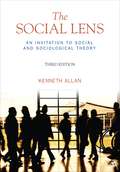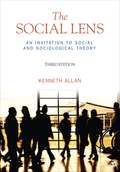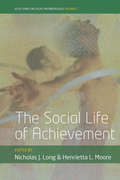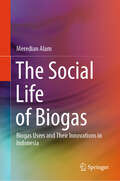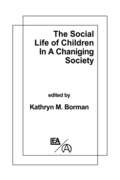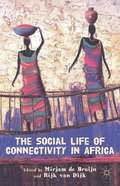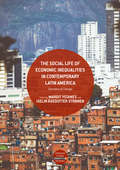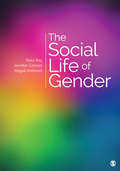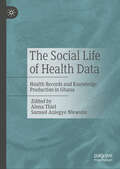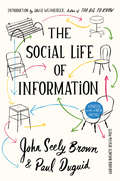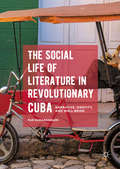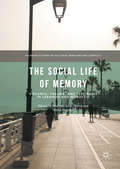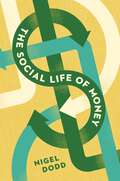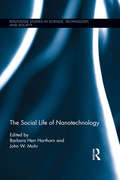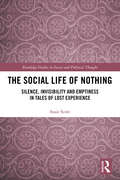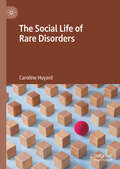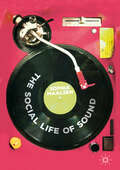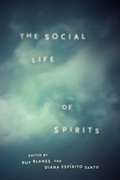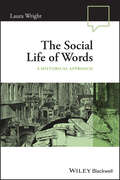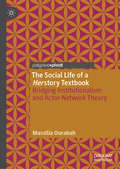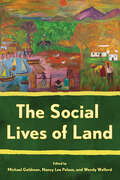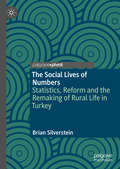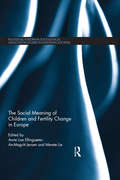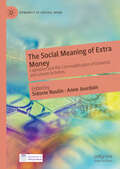- Table View
- List View
The Social Lens: An Invitation to Social and Sociological Theory
by Kenneth AllanThis fully updated edition of Kenneth Allan’s acclaimed social theory text emphasizes the diversity of classical and contemporary theory, critical thinking, and the importance of historical context. Chosen for the diversity of their perspectives and their suitability for introducing students to contemporary social thought, a wide variety of theorists appear in the text with their individual voices vividly intact. The author engages students in the historic and contemporary changes that have spawned diverse social theories and invites them to see theory as an element within a broader range of critical thinking skills that can be applied to current social problems. Contributor to the SAGE Teaching Innovations and Professional Development Award
The Social Lens: An Invitation to Social and Sociological Theory (Third Edition)
by Kenneth AllanThis fully updated Third Edition of Kenneth Allan’s acclaimed The Social Lens emphasizes the diversity of classical and contemporary theory, critical thinking, and the importance of historical context. Chosen for the diversity of their perspectives and their suitability for introducing students to contemporary social thought, a wide variety of theorists appear in the text with their individual voices vividly intact. The author engages students in the historic and contemporary changes that have spawned diverse social theories and invites them to see theory as an element within a broader range of critical thinking skills that can be applied to current social problems.
The Social Life of Achievement
by Nicholas J. Long Henrietta L. MooreWhat happens when people "achieve"? Why do reactions to "achievement" vary so profoundly? And how might an anthropological study of achievement and its consequences allow us to develop a more nuanced model of the motivated agency that operates in the social world? These questions lie at the heart of this volume. Drawing on research from Southeast Asia, Europe, the United States, and Latin America, this collection develops an innovative framework for explaining achievement's multiple effects-one which brings together cutting-edge theoretical insights into politics, psychology, ethics, materiality, aurality, embodiment, affect and narrative. In doing so, the volume advances a new agenda for the study of achievement within anthropology, emphasizing the significance of achievement as a moment of cultural invention, and the complexity of "the achiever" as a subject position.
The Social Life of Biogas: Biogas Users and Their Innovations in Indonesia
by Meredian AlamThis is the most comprehensive book discussing the impact of renewable energy transition by engaging local narratives, and combining this with the domestication of technology theory. Addressing a specific concern, the discussion considers the development of household biogas from an interdisciplinary sociological perspective and addresses the success factors for the implementation of biogas policy on the household level in Indonesia. Drawing upon extensive ethnographic fieldwork in a rural Indonesia, this book explores the interactive process of social and technological innovation from a user perspective. Their social interactions with wider stakeholders such as biogas technology trainers, laborers, construction partner organizations, and fellow users are examined. The author sheds light on emerging evidence around biogas sustainability by engaging a unique interdisciplinary framework that combines aspects of both sociology and engineering. Offering a unique insight, this book is relevant for social scientists, postgraduate students, social workers, environmental activists, communication experts, and engineers working across aspects of renewable energy development. They will gain new interdisciplinary insights and applicable approaches to building household biogas by actively engaging the users.
The Social Life of Children in a Changing Society
by Kathryn M. BormanThis book developed from a symposium in which participants examined childhood socialization from a number of perspectives and with several disciplinary lenses. The major purpose of the symposium and thus of this volume is to provide an integrative, multidisciplinary discussion of the social development of preschool and young elementary school-aged children. As a result, there are contributions to this volume from anthropologists (Leacock, Ogbu), psychologists (Lippincott, Mueller, Ramey and Snow), sociologists (Borman, Denzin) and scholars who have self-consciously adopted an interdisciplinary framework. First published in 1984. Routledge is an imprint of Taylor & Francis, an informa company.
The Social Life of Connectivity in Africa
by Mirjam De Bruijn Rijk Van DijkThe rapid increase in adoption of modern 'connective' technologies like the mobile phone has reshaped the social landscape of Africa. This book examines the myriad possibilities that the post-global moment offers African societies to develop and to relate, offering profound new insights into the processes of globalization.
The Social Life of Economic Inequalities in Contemporary Latin America
by Margit Ystanes Iselin Åsedotter StrønenThis book is open access under a CC BY 4. 0 license. This edited volume examines how economic processes have worked upon social lives and social realities in Latin America during the past decades. Through tracing the effects of the neoliberal epoch into the era of the so-called pink tide, the book seeks to understand to what extent the turn to the left at the start of the millennium managed to challenge historically constituted configurations of inequality. A central argument in the book is that in spite of economic reforms and social advances on a range of arenas, the fundamental tenants of socio-economic inequalities have not been challenged substantially. As several countries are now experiencing a return to right-wing politics, this collection helps us better understand why inequalities are so entrenched in the Latin American continent, but also the complex and creative ways that it is continuously contested. The book directs itself to students, scholars and anyone interested in Latin America, economic anthropology, political anthropology, left-wing politics, poverty and socio-economic inequalities.
The Social Life of Gender (SAGE Sociological Essentials Series)
by Raka Ray Jennifer Carlson Abigail AndrewsThe Social Life of Gender provides a comprehensive approach to gender as an organizing principle of institutions, history, and unequal interpersonal relations. This new title will develop students’ capacity to use gender analysis to question social life more broadly, presenting a critical sociology based on the unique insights gleaned from the study of gender. Through bold, concise, and intellectually generative writing, the authors explore culture, geopolitics, and the economy, providing students with a succinct, accessible, and critical grasp of core debates in the sociology of gender.
The Social Life of Gender (SAGE Sociological Essentials Series)
by Raka Ray Jennifer Carlson Abigail AndrewsThe Social Life of Gender provides a comprehensive approach to gender as an organizing principle of institutions, history, and unequal interpersonal relations. This new title will develop students’ capacity to use gender analysis to question social life more broadly, presenting a critical sociology based on the unique insights gleaned from the study of gender. Through bold, concise, and intellectually generative writing, the authors explore culture, geopolitics, and the economy, providing students with a succinct, accessible, and critical grasp of core debates in the sociology of gender.
The Social Life of Health Data: Health Records and Knowledge Production in Ghana
by Alena Thiel Samuel Aniegye NtewusuThis book takes the contemporary moment of digital health infrastructuring in Ghana as a starting point to examine the genealogies of oral, paper-based and digital forms of knowledge production about health. In view of this multiplicity of forms, the chapters adopt a broad definition of health data that encompasses databases, statistics as well as oral and written records and reports about health. In addition to close historiographic insights into the interactions of indigenous and colonial ways of organising knowledge around health, the chapters explore contemporary ways in which medical professionals are mobilized or potentially demobilized by the standards, methods and calculative devices that accompany the increasing production of health data. The authors show that the contemporary hype around the datafication of health is neither new nor exceptional, but instead needs to be read in broader historical perspective. Through its unique combination of historical, sociological and ethnographic methods, the book shows that the regulation and standardization of health produces both mobilizations and demobilizations, as well as appropriations and resistances.
The Social Life of Information: Updated, with a New Preface
by David Weinberger John Seely Brown Paul Duguid"Should be read by anyone interested in understanding the future,” The Times Literary Supplement raved about the original edition of The Social Life of Information. We’re now living in that future, and one of the seminal books of the Internet Age is more relevant than ever.The future was a place where technology was supposed to empower individuals and obliterate social organizations. Pundits predicted that information technology would obliterate the need for almost everything-from mass media to bureaucracies, universities, politics, and governments. Clearly, we are not living in that future. The Social Life of Information explains why.John Seely Brown and Paul Duguid show us how to look beyond mere information to the social context that creates and gives meaning to it. Arguing elegantly for the important role that human sociability plays, even-perhaps especially-in the digital world, The Social Life of Information gives us an optimistic look beyond the simplicities of information and individuals. It shows how a better understanding of the contribution that communities, organizations, and institutions make to learning, working, and innovating can lead to the richest possible use of technology in our work and everyday lives.With a new introduction by David Weinberger and reflections by the authors on developments since the book’s first publication, this new edition is essential reading for anyone seeking to understand the human place in a digital world.
The Social Life of Literature in Revolutionary Cuba
by Par KumaraswamiThis study explores the social functions of literature from the perspective of policymakers, writers, readers and residents in contemporary Cuba. It provides a new perspective on post-59 Cuban literature that underlines how cultural policy has made literature a hybrid activity between elite and mass culture, with inherent social, rather than aesthetic or political, value. Whilst many traditional studies of Cuban literature assume either its subjugation to politics and ideology or, conversely, its role in resisting political discourse via a rather na#65533;ve notion of artistic freedom, this project explores the varied, dynamic and multiple ways in which literature works in Cuban society: as a catalyst for identity construction aimed at consensus and belonging, but also as an instrument of self-differentiation and self-definition, even in the more recent context of a more market-oriented system. The study reviews policy from 1959 to the present, and presents contemporary case studies exploring the social functions of literature for writers, readers and ordinary Havana residents.
The Social Life of Memory
by Norman Saadi Nikro Sonja HegasyThis edited volume addresses memory practices among youth, families, cultural workers, activists, and engaged citizens in Lebanon and Morocco. In making a claim for 'the social life of memory,' the introduction discusses a particular research field of memory studies, elaborating an approach to memory in terms of social production and engagement. The Arab Spring is evoked to draw attention to new rifts within and between history and remembrance in the regions of North Africa and the Middle East. As authoritarian forms of governance are challenged, official panoramic narratives are confronted with a multiplicity of memories of violent pasts. The eight chapters trace personal and public inventories of violence, trauma, and testimony, addressing memory in cinema, in newspapers and periodicals, as an experience of public environments, through transnational and diasporic mediums, and amongst younger generations.
The Social Life of Money
by Nigel DoddA reevaluation of what money is—and what it might beQuestions about the nature of money have gained a new urgency in the aftermath of the global financial crisis. Even as many people have less of it, there are more forms and systems of money, from local currencies and social lending to mobile money and Bitcoin. Yet our understanding of what money is—and what it might be—hasn't kept pace. In The Social Life of Money, Nigel Dodd, one of today’s leading sociologists of money, reformulates the theory of the subject for a postcrisis world in which new kinds of money are proliferating.What counts as legitimate action by central banks that issue currency and set policy? What underpins the right of nongovernmental actors to create new currencies? And how might new forms of money surpass or subvert government-sanctioned currencies? To answer such questions, The Social Life of Money takes a fresh and wide-ranging look at modern theories of money.One of the book’s central concerns is how money can be wrested from the domination and mismanagement of banks and governments and restored to its fundamental position as the "claim upon society" described by Georg Simmel. But rather than advancing yet another critique of the state-based monetary system, The Social Life of Money draws out the utopian aspects of money and the ways in which its transformation could in turn transform society, politics, and economics. The book also identifies the contributions of thinkers who have not previously been thought of as monetary theorists—including Nietzsche, Benjamin, Bataille, Deleuze and Guattari, Baudrillard, Derrida, and Hardt and Negri. The result provides new ways of thinking about money that seek not only to understand it but to change it.
The Social Life of Nanotechnology (Routledge Studies in Science, Technology and Society #18)
by Barbara Herr Harthorn John W. MohrThis book addresses the interconnections and tensions between technological development, the social benefits and risks of new technology, and the changing political economy of a global world system as they apply to the emerging field of nanotechnologies. The basic premise, developed throughout the volume, is that nanotechnologies have an undertheorized and often invisible social life that begins with their constructed origins and propels them around the globe, across multiple localities, institutions and collaborations, through diverse industries, research labs, and government agencies and into the public sphere. The volume situates nano innovation and development as a modernist science and technology project in a tense and unstable relationship with a fractured, postmodern social world. The book is unique in incorporating and integrating studies of innovation systems along with a focus on the risks and consequences of a globally significant set of emerging technologies. It does this by examining the social and political conditions of their creation, production, emergence, and reception.
The Social Life of Nothing: Silence, Invisibility and Emptiness in Tales of Lost Experience (Routledge Studies in Social and Political Thought)
by Susie ScottNothing really matters. All the things that we do not do, have or become in our lives can be important in shaping self-identity. From jobs turned down to great loves lost, secrets kept and truths untold, people missed and souls unborn, we understand ourselves through other, unlived lives that are imaginatively possible. This book explores the realm of negative social phenomena – no-things, no-bodies, non-events and no-where places – that lies behind the mirror of experience. Taking a symbolic interactionist perspective, the author argues that these objects are socially produced, emerging from and negotiated through our relationships with others. Nothing is interactively accomplished in two ways, through social acts of commission and omission. Existentialism and phenomenology encourage us to understand more deeply the subjective experience of nothing; this can be pursued through conscious meaning-making and reflexive self-awareness. The Social Life of Nothing is a thought-provoking book that will appeal to scholars across the social sciences, arts and humanities, but its message also resonates with the interested general reader.
The Social Life of Rare Disorders
by Caroline HuyardThis book is the first comprehensive study of rare disorders from a historical, political, and social perspective. It is estimated that around 300 million people worldwide live with a rare disorder today. What do patients and associations concerned by one of the 7,000 known rare diseases have in common, and what does rarity mean to them? How did rare disorders become a mainstream category in public health policy? To answer these questions, Caroline Huyard traces the history, over more than 50 years, of medical treatments for one particular disease, and that of the orphan drug status in the United States and in Europe. The book shows that public authorities had a much greater role than biomedicine in turning rare disorders into a public health problem. A comparison of patients' experiences of 6 rare diseases as well as the activities of 8 associations in France underlines the importance of isolation and care for patients on the one hand, and the role of stakeholders’ participation for associations on the other hand. This book is essential reading for researchers and students interested in contemporary healthcare systems and topics related to public policies on emerging issues, the industrialisation and regulation of medicine, the concept of care, and the governance of patient organisations.
The Social Life of Sound
by Sophia MaalsenThe Social Life of Sounds argues for the agency of sounds and music and the acceleration of their social lives in the Digital Age. Drawing upon research with composers, producers, record collectors, DJs and record labels, the book problematises the notion of artistic authorship as it is framed in Western systems of property. Acknowledging that ‘things’ – sounds, samples, and recorded music – and people are co-constituted and that personhood is distributed through things and their reuse, Maalsen makes a case for understanding sound as multibiographical and challenges the possessive individual that is the basis of artistic copyright.
The Social Life of Spirits
by Ruy Blanes Diana Espírito SantoSpirits can be haunters, informants, possessors, and transformers of the living, but more than anything anthropologists have understood them as representations of something else—symbols that articulate facets of human experience in much the same way works of art do. The Social Life of Spirits challenges this notion. By stripping symbolism from the way we think about the spirit world, the contributors of this book uncover a livelier, more diverse environment of entities—with their own histories, motivations, and social interactions—providing a new understanding of spirits not as symbols, but as agents. The contributors tour the spiritual globe—the globe of nonthings—in essays on topics ranging from the Holy Ghost in southern Africa to spirits of the “people of the streets” in Rio de Janeiro to dragons and magic in Britain. Avoiding a reliance on religion and belief systems to explain the significance of spirits, they reimagine spirits in a rich network of social trajectories, ultimately arguing for a new ontological ground upon which to examine the intangible world and its interactions with the tangible one.
The Social Life of Words: A Historical Approach (Language in Society)
by Laura WrightA new approach to sociolinguistics, introducing the study of the social meaning of English words over time, and offering an engaging and entertaining demonstration of lexical sociolinguistic analysis The Social Life of Words: A Historical Approach explores the rise and fall of the social properties of words, charting ways in which they take on new social connotations. Written in an engaging narrative style, this entertaining text matches up sociolinguistic theory with social history and biography to discover which kind of people used what kind of word, where and when. Social factors such as class, age, race, region, gender, occupation, religion and criminality are discussed in British and American English. From familiar words such as popcorn, porridge, café, to less common words like burgoo, califont, etna, and phrases like kiss me quick, monkey parade, slap-bang shop, The Social Life of Words demonstrates some of the many ways a new word or phrase can develop social affiliations. Detailed yet accessible chapters cover key areas of historical sociolinguistics, including concepts such as social networks, communities of practice, indexicality and enregisterment, prototypes and stereotypes, polysemy, onomasiology, language regard, lexical appropriation, and more. The first book to take a focused look at lexis as a topic for sociolinguistic analysis, The Social Life of Words: Introduces sociolinguistic theories and shows how they can be applied to the lexicon Demonstrates how readers can apply sociolinguistic theory to their own analyses of words in English and other languages Provides an engaging and amusing new look at many familiar words, inviting students to explore the sociolinguistic properties of words over time for themselvesPart of Wiley Blackwell’s acclaimed Language in Society series, The Social Life of Words is essential reading for upper-level undergraduate students, graduate students, postdoctoral researchers, and linguists working in sociolinguistics, lexical semantics, English lexicology, and the history and development of modern English.
The Social Life of a Herstory Textbook: Bridging Institutionalism and Actor-Network Theory
by Massilia OurabahThis book studies the possibility for feminist educational change by examining a case study on the social life of a French gender and women history textbook. Massilia Ourabah opens a unique and timely dialogue between two antagonistic sociological trends: institutionalism and actor-network theory (ANT), and more specifically the inhabited institution approach and the sociology of translation. The structure of the book is dual: it offers one version of the case study grounded in the institutionalist approach, and another version grounded in the translational approach. The goal is to show that through the introduction of institutional elements and the rejection of some of ANT’s strongest assumptions, the critical value of ANT can be restored and prove a useful framework for studying sociomaterial networks in education. The book also engages with feminist pedagogy and discusses the implications of the case study for the prospect of a more gender-balanced educational curriculum.
The Social Lives of Land (Cornell Series on Land: New Perspectives on Territory, Development, and Environment)
by Goldman Et Al.From the shaping of new homelands in the Cherokee Nation to the export of sand from Cambodia to shore up urban expansion in Singapore, The Social Lives of Land reveals the dynamics of contemporary social and political change. The editors of this volume bring together contributions from across multiple disciplines and geographic locations. The contributions showcase novel theoretical and empirical insights, analyzing how people are living on, with, and from their land. From Mozambique to India, Indonesia, Ecuador, and the colonial United States, the scholars in this collection uncover histories and retell stories with a focus on the lived experiences of rural and urban land dispossession and repossession.Contributors: Kati Álvarez, Clint Carroll, Flora Lu, Richard Mbunda, Gregg Mitman, Paul Nadasdy, Robert Nichols, Andrew Ofstehage, Laura Schoenberger, Kirsteen Shields, Emmanuel Sulle, Erik Swyngedouw, Gabriela Valdivia, Katherine Verdery, Callum Ward, Ciara Wirth, Emmanuel King Urey Yarkpawolo
The Social Lives of Numbers: Statistics, Reform and the Remaking of Rural Life in Turkey
by Brian SilversteinThis book examines the changing role of statistics in institutional reform in Turkey, and the unanticipated ways in which such changes transform livelihoods as well. Turkish agriculture is undergoing its most profound transformation since the establishment of the Republic in the 1920s. Seemingly minor technical adjustments in farmers’ reporting requirements and practices to collect better data on agriculture for statistics are also having a rapid and massive effect on farmers’ practices and livelihoods. The attempt to understand agriculture in Turkey in new ways is changing agriculture itself. The relationship between statistics and social and natural phenomena is thus performative, and such performativity undergirds a great deal of socio-technical change in the world. Drawing on fieldwork in Turkey with statisticians, farmers and agricultural extension technicians, the book shows how alongside deliberation about reforms, it is in and through this performativity that much of the work of institutional commensuration actually happens.
The Social Meaning of Children and Fertility Change in Europe (Studies in European Sociology)
by Anne Lise Ellingsæter Merete Lie An-Magritt JensenLow fertility in Europe has given rise to the notion of a ‘fertility crisis’. This book shifts the attention from fertility decline to why people do have children, asking what children mean to them. It investigates what role children play in how young adults plan their lives, and why and how young adults make the choices they do. The book aims to expand our comprehension of the complex structures and cultures that influence reproductive choice, and explores three key aspects of fertility choices: the processes towards having (or not having) children, and how they are underpinned by negotiations and ambivalences how family policies, labour markets and personal relations interact in young adults’ fertility choices social differentiation in fertility choice: how fertility rationales and reasoning may differ among women and men, and across social classes Based on empirical studies from six nations – France, Scandinavia, Denmark, Norway, Sweden, Germany and Italy (representing the high and low end of European variation in fertility rates) – the book shows how different economic, political and cultural contexts interact in young adults' fertility rationales. It will be of interest to students and scholars of sociology, anthropology, demography and gender studies.
The Social Meaning of Extra Money: Capitalism and the Commodification of Domestic and Leisure Activities (Dynamics of Virtual Work)
by Sidonie Naulin Anne JourdainWhy do ordinary people who used to engage in domestic and leisure activities for free now try to make a profit from them? How and why do people commodify their free time? This book explores the marketization of blogging, cooking, craftwork, gardening, knitting, selling second-hand items, sexcamming, and more generally the economic use of free time. It outlines how the development of web platforms, the current economic context and post-Fordist values can account for this extension of market and labor.Drawing on a range of interviews, ethnographic observations, and quantitative surveys, the contributors question the empowering effects of commodification, with a specific focus on how gender and class inequalities affect the social meanings of extra money. Ultimately, the collective findings demonstrate how commodification pervades even the most mundane social activities. This research will be invaluable to scholars and students with a focus on gender and digital sociology, the sociology of work and labour, and the marketization of leisure.
